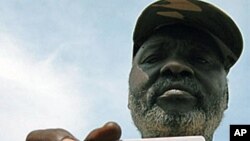A new report released by the Geneva-based Small Arms Survey project warns that the current Disarmament, Demobilization and Reintegration strategies in Southern Sudan are falling short as the South prepares for its referendum on independence.
According to the report, entitled "Unrealistic Expectations, the Disarmament, Demobilization and Reintegration" program undertaken in Southern Sudan is unlikely to improve social and economic conditions in the fragile region.
The program, known as DDR, is part of the Comprehensive Peace Agreement laid out in 2005 after an end to more than 20 years of war between the government in Khartoum and the Southern People's Liberation Army. The DDR program began in 2009 after four years of negotiations over its implementation, only two years before its originally planned completion in 2011.
The Small Arms Survey report focuses specifically on the reintegration aspect of the program. The DDR process, run jointly by the Sudanese Armed Forces and the Southern People's Liberation Army with support from international organizations, focuses on re-inserting combatants from the civil war into Sudanese society.
According to the report, the choice to focus on individual reintegration has cut the communities receiving ex-combatants out of the process, hurting the overall goal of recovery and stability in the South. This could prove dangerous as the South prepares for its January referendum to determine whether South Sudan becomes an independent nation.
Report author Julie Brethfeld says ex-combatants could become a major destabilizing factor if not properly reintegrated.
"I think the next year will be very difficult and challenging. If you are in a situation with such a high potential for tension, if you then have people who know how to fight who have, probably, access to weapons, and who might be not satisfied with their current lives and their current opportunities, the risk is, of course, much higher that they can be very easily instrumentalized. That is the big risk, because it is a quite volatile situation and will, I guess, remain difficult in the next year," she said.
One of the major issues, says Brethfeld, is jobs. Through the current process, ex-combatants are provided with job-training and support to re-enter society, but the southern economy is far from robust, and soldiers may be unable to find jobs when they return home.
According to Brethfeld, the DDR process must be linked to the broader recovery and development efforts of South Sudan. Local communities must receive support so that returning soldiers can be accommodated socially and economically, otherwise they will be forced to bear the burden of frustrated and unemployed returnees.
Another problem lies with the communities themselves. The report indicates that, in many cases, individual circumstances may make reintegration impossible. If ex-combatants have committed acts for which they cannot return, communities must be consulted. If return is not possible, other options must be considered to prevent estranged citizens from returning to arms.
Southerners are widely expected to choose independence at the polls in January. If solutions are not found for the question of reintegration, Africa's newest nation could risk instability even before its creation.




